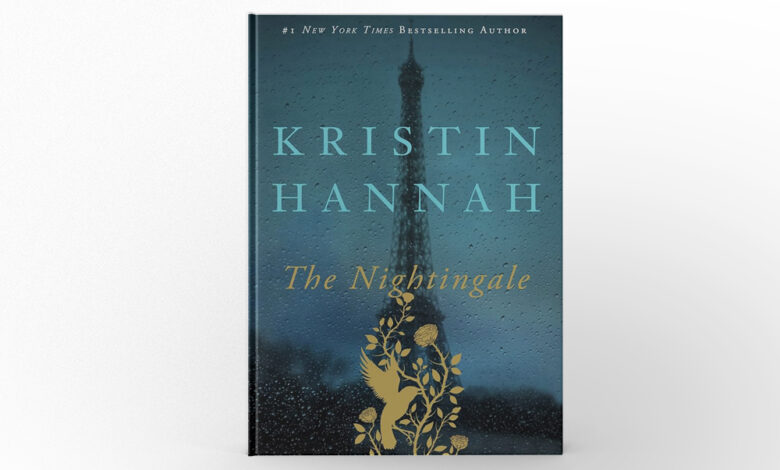The Nightingale by Kristin Hannah
The Nightingale: A Heart-Wrenching Tale of Courage and Survival

Kristin Hannah’s “The Nightingale” is a deeply moving historical novel that explores the resilience of the human spirit in the face of unimaginable adversity. Set during World War II in German-occupied France, “The Nightingale” delves into the lives of two sisters as they navigate the dangers of war and the complexities of family loyalty. This poignant tale not only sheds light on the hardships endured by those living through wartime but also highlights the courage and sacrifice that define the human experience. In this article, we will delve into the novel’s plot, themes, and lasting impact, providing a comprehensive overview of this powerful story.
Author’s Background
Kristin Hannah, an accomplished American author, was born in 1960 in Southern California. Known for her evocative storytelling and emotionally charged narratives, Hannah has made a significant mark in contemporary literature. Before becoming a full-time writer, Hannah worked as a lawyer and a television producer. Her extensive experience in crafting compelling stories is evident in her novels, which often explore themes of love, loss, and personal strength.
“The Nightingale” is one of Hannah’s most celebrated works, earning widespread acclaim for its vivid portrayal of historical events and the depth of its characters. Hannah’s ability to blend historical accuracy with emotional depth has resonated with readers worldwide, solidifying her reputation as a master storyteller. Other notable works by Hannah include “The Great Alone” and “Firefly Lane.” Her books often focus on themes of family, friendship, and resilience, reflecting her passion for exploring the complexities of the human condition.
In Depth Summary
“The Nightingale” follows the lives of two sisters, Vianne and Isabelle Rossignol, as they navigate the harrowing experiences of World War II in France. The novel is set against the backdrop of the German occupation, and it captures the personal and societal upheavals experienced by the characters during this tumultuous period.
The story begins with Vianne Rossignol, who lives a relatively quiet life with her husband and young daughter in the small French village of Carriveau. As the war escalates, Vianne’s world is upended when her husband, Antoine, is sent to fight at the front lines. Vianne is left to manage the household and care for her daughter while coping with the harsh realities of occupation. The arrival of a German officer, Captain Beck, who is billeted in her home, complicates her situation further. Despite the challenges, Vianne strives to protect her family and maintain a semblance of normalcy.
In contrast, Isabelle Rossignol, Vianne’s younger sister, is fiercely independent and determined to resist the German forces. After being expelled from multiple boarding schools, Isabelle joins the French Resistance, becoming a key figure in the fight against the Nazis. Her bravery and resourcefulness earn her the code name “The Nightingale,” and she undertakes dangerous missions to help Allied soldiers escape from France. Isabelle’s journey is marked by both personal sacrifices and heroic feats, showcasing her unwavering commitment to the cause.
As the war progresses, the lives of the two sisters become increasingly intertwined with the broader conflict. Vianne faces the challenges of living under occupation while grappling with the moral dilemmas of cooperating with the enemy to protect her loved ones. Meanwhile, Isabelle’s daring actions put her life at risk as she navigates the perils of espionage and resistance work. The novel vividly depicts the emotional and physical toll of the war on both sisters, highlighting their courage and resilience.
The story reaches its climax with the culmination of Isabelle’s resistance efforts and the ultimate cost of Vianne’s choices. The novel’s resolution brings a powerful conclusion to the sisters’ journeys, emphasizing the themes of sacrifice, bravery, and the enduring strength of familial bonds.
Themes and Insights
“The Nightingale” explores several profound themes that resonate deeply with readers:
- Courage and Sacrifice: At the heart of the novel is the theme of courage in the face of overwhelming adversity. Both Vianne and Isabelle demonstrate extraordinary bravery, though in different ways. Vianne’s sacrifices are more personal, focusing on her struggle to protect her family, while Isabelle’s heroism involves direct action against the enemy. The novel underscores the different forms of courage and the personal costs associated with each.
- The Impact of War: The novel vividly portrays the impact of war on individuals and families. Through the experiences of the Rossignol sisters, readers gain insight into the physical and emotional toll of living under occupation. The narrative highlights the profound effects of war on personal relationships, community life, and individual identity.
- Family and Loyalty: The relationship between Vianne and Isabelle is central to the novel, showcasing the complexities of sibling bonds and the strength of family loyalty. Despite their differences, the sisters’ love for each other remains a driving force throughout the story. Their shared experiences and mutual support underscore the importance of familial connections in times of crisis.
- Resilience and Hope: Despite the grim circumstances, “The Nightingale” is ultimately a story of resilience and hope. The characters’ determination to survive and make a difference amid the chaos of war highlights the human capacity for endurance and optimism.
Personal Reflections
Reading “The Nightingale” is an emotionally charged experience that leaves a lasting impression. Kristin Hannah’s ability to capture the raw emotions and complexities of wartime life is both compelling and moving. The novel’s portrayal of the sisters’ courage and resilience serves as a powerful reminder of the human spirit’s ability to overcome even the darkest challenges.
The contrast between Vianne and Isabelle’s experiences offers a nuanced perspective on the different ways individuals respond to conflict. Vianne’s struggle to maintain her family’s safety and Isabelle’s daring resistance work both highlight the diverse forms of bravery and sacrifice. Hannah’s rich, descriptive writing immerses readers in the historical setting, making the story’s impact all the more profound.
Recommendation
“The Nightingale” is highly recommended for readers who appreciate historical fiction that combines emotional depth with a gripping narrative. The novel’s exploration of war, family, and courage makes it a compelling read for those interested in stories that highlight the human capacity for resilience. It is particularly suitable for fans of historical dramas and anyone seeking a powerful, thought-provoking tale.
Impact and Legacy
“The Nightingale” has made a significant impact in the literary world, earning critical acclaim and widespread popularity. The novel has been praised for its emotional intensity, historical accuracy, and the depth of its characters. It has also been adapted into a successful film, further extending its reach and influence.
Kristin Hannah’s work has contributed to a greater understanding of the experiences of women and families during wartime. “The Nightingale” serves as a testament to the strength and resilience of individuals in the face of adversity, and its legacy continues to resonate with readers around the world.
Conclusion
Kristin Hannah’s “The Nightingale” is a powerful and evocative novel that explores the themes of courage, sacrifice, and the impact of war on individuals and families. Through the compelling stories of Vianne and Isabelle Rossignol, the novel provides a poignant reflection on the human spirit’s ability to endure and overcome adversity. Its rich narrative and emotional depth make it a timeless work that continues to captivate and inspire readers.

